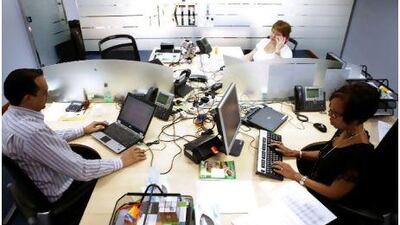There are more than 600 million faces on Facebook, and the number of regular users is expected to rise to 1 billion in the next few years.
The social networking site overtook Google last year as the most visited website in the US and ranks as one of the top websites in the Middle East, with 15 per cent of the site's user base living in the region.
Facebook, which was recently valued at US$50 billion (Dh184bn), is the second most popular website in Egypt, while it ranks fourth in Saudi Arabia, according to the web information company Alexa.com. Any local start-up trying to compete with the US giant faces an epic battle.
That has not stopped a host of social networking sites setting up shop in the Middle East, vying for the attention of local consumers, including more than 90 million Facebook members.
Is this a battle worth fighting, given the dominance of sites such as Facebook and LinkedIn?
Many consumers in the region will be loath to set up another account, remember another login and password, and upload reams of personal information that is already on international sites.
But the founders of home-grown versions of Facebook and LinkedIn say their sites have something else to offer: true regional relevance.
The potential of Middle East social networking sites was illustrated by Yahoo's acquisition of the Maktoob portal for $164 million in 2009.
Other such sites in the region include Jeeran, which is based in Jordan, and Anayou, which was launched last year by the UAE telecommunications operator du.
More sites are emerging in this increasingly crowded market. One is Alshabaka.me, a Middle East take on LinkedIn. The site was originally called Intheloop.me but was recently rebranded to emphasise its Arab roots.
Rony el Nashar, the founder of Alshabaka, says the site has several advantages over LinkedIn. "The most obvious one is the ability to communicate in Arabic. LinkedIn doesn't have an Arabic interface," Mr el Nashar says. "The second thing is that you can't really have a 'one size fits all' model that fits all cultures across the globe.
"When it comes to professional networking, there's definitely value in being local. If you're focused on building a social network that's regionally orientated, people will automatically gravitate towards it."
Another LinkedIn-style web business is being developed by the online jobs portal Bayt.com.
Bayt is building a network of sites focusing on different sectors, which will allow users to set up profiles, make contact with industry peers and comment on business articles.
The first community is MarketingHub.me, which is geared towards marketing professionals and claims to have attracted between 20,000 and 25,000 registered users since its launch last month.
But what is the point? LinkedIn, the go-to website for professionals, has several groups focused on marketing. Why build another site?
Ali Sinaei, the head of advertising sales and commercial content at Bayt.com, says the likes of Facebook and LinkedIn "don't provide you with localised content". But the Bayt communities have articles written by local commentators, Mr Sinaei says.
"Any region demands and clamours for content and things written for themselves in particular," he says.
"One real opportunity for social networks here in the region is to couple a user's network of friends and followers with localised content that is of importance to them. Giving me something I can relate to in my own day-to-day life is much more interesting."
Mr Sinaei says MarketingHub has "about 20 or 25 conversations going on at any one time", with information specifically for the Middle East making the site distinct from LinkedIn.
"You don't join LinkedIn to have conversations. You don't join LinkedIn to get content," he says. "Everyone who is on MarketingHub has exactly the same interests as you. The understanding from the beginning is that it's [about] marketing in the Middle East."
Bayt plans to launch more LinkedIn-style communities this year, Mr Sinaei says. "We're looking to roll out six communities this year. Our second community, which is aimed at female professionals, is aimed to be launched at the end of this month.
"The kind of content we're going to be rolling out is really varied. [The new site will have contributions] from women in the region who have made a name for themselves and are at the top of their profession."
Local relevance is also key to SocialCirclesUAE.com, a Facebook-style site that launched in 2009. While the site's membership base is overshadowed by many international sites, the founder of SocialCircles, Rachel Morton, says it provides a local experience not found on other networks.
The site has more than 200 sub-groups around interests such as scuba diving, tennis, food, even shisha smoking, Ms Morton says. The site is focused on local events.
One successful event was "a camping trip to Oman where 16 4x4s, with around 50 strangers, drove together for hours to camp and hike and make new friends," she says.
"Events are a big part of it. At the last event there were 150 people."
Ms Morton says the site is currently making money through advertising and sponsorship, and has a growing user base. "Today we have 5,268 members on the site. We have about 200,000 page views a month."
While SocialCirclesUAE is a "pure" social networking site, some commentators say there is room in the market for sites that employ social aspects but do not try to recreate what is done by the likes of Facebook and LinkedIn.
Mr el Nashar says he sees many opportunities for sites that employ aspects of social media in the Middle East.
"There are an infinite amount of possibilities for social networking in the Middle East region," he says. "Maybe not just for pure social networking sites like Facebook, but for sites that introduce social networking concepts to a unique business idea."

